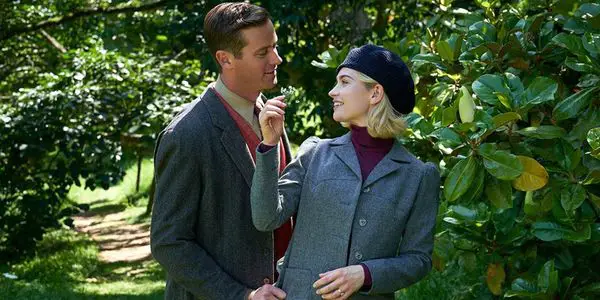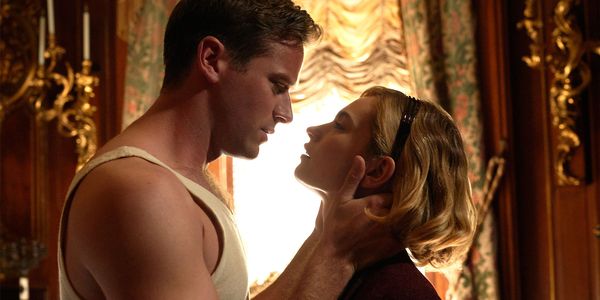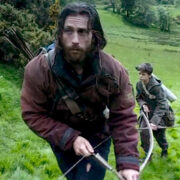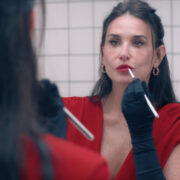REBECCA: Ben Wheatley Heads To Manderley With Mixed Results

Andrew Young is a freelance writer on film and culture…
It is perfectly possible to have gone through life never having heard of Rebecca. That said, this is a story more familiar than most; and with that comes great pressure. If you are one of the lucky ones coming to Ben Wheatley’s new film, his first for Netflix, without the slightest idea of what a Manderley, a de Winter or a Rebecca is, then you’re in for a treat. Here is a well-acted, gorgeously designed period mystery that has the luxury of starting off with a great story.
That said, prior knowledge of Daphne du Maurier’s novel, or perhaps the Oscar-laden Alfred Hitchc*ck adaptation from eight decades ago, might make Wheatley’s Rebecca harder to love. Wheatley, known as an exciting, typically low-budget filmmaker, has taken on a memorable story, full of rich characters and plot twists, but to middling effect. His Rebecca is no butchering, no disaster as some would have you believe, but it is a missed opportunity. A chance spurned to do something fresh and truly thrilling with this deliciously dark material.
A Classic Tale
For those not in the know, du Maurier’s story, which has influenced the likes of Phantom Thread over the years, concerns one Maxim de Winter. A dashing widower, de Winter is on holiday in Monte Carlo when we meet him, where he soon meets an orphaned lady’s maid whose name we never discover. Before long, the two are in love and de Winter hastily proposes, making our unnamed protagonist ‘the new Mrs. de Winter’.

It is the ‘new’ which is crucial in that moniker, for the Rebecca of the title is de Winter’s first wife, who died before the story begins. Her stature when alive, however, her reputation for beauty, intelligence, and grace, was so great that she seems able to dictate events from beyond the grave. It is Rebecca who affects everyone’s moods and motivations throughout the story, making her the central figure without even needing to appear.
Rebecca makes a particularly big impression on the new Mrs. de Winter. Following that particularly fruitful holiday romance, she returns with Maxim to his famed stately home Manderley. It is here that the trouble really starts for de Winter’s second wife. Whenever Rebecca’s name is mentioned Maxim shuts down the conversation and/or leaves the room, and nobody can stop banging on about how bloody wonderful Rebecca was. Needless to say, this doesn’t make the new bride feel at home.
Chief in making the new Mrs. de Winter feel infinitely inferior to Rebecca is Manderley’s head housekeeper Mrs. Danvers. Rebecca’s closest confidant, Danvers seems to cope with her grief by making life hell for the new lady of the house, constantly reminding her of how much Maxim loved his dear Rebecca. Throughout this, one thing remains unanswered. How exactly did Rebecca die? We are told she drowned but it is obvious from the first frame that there is more to it.

That is the basic set-up of Rebecca in all its incarnations, with the story kicking into gear as the mystery of Rebecca’s fate unravels, and the new Mrs. de Winter steadily feels more and more haunted by the ghost of her predecessor. For the most part, Wheatley’s version nicely overlays these basic foundations. The Monte Carlo opening is suitably sun-drenched and glamorous, with Sarah Greenwood and Julian Day providing great production and costume design respectively. Manderley itself, however, feels a tad unremarkable. Large, handsome, and imposing, yes, but lacking in memorable character.
The same could be said of Armie Hammer as Maxim de Winter. A strong actor who is not giving a bad performance here, Hammer feels miscast as the traditional older man. In the book and in Hitchc*ck’s version (which had Laurence Olivier in the role), Maxim is around 20 years older than his second wife, lending her a naive innocence and he a command and weariness. Hammer, the model image of the clean-cut leading man, lacks a genuinely wounded quality that would have improved his character here.
There are just three years separating Hammer and Lily James, who takes on the lead role of the new Mrs. de Winter. For her part, James is reliably engaging. A more likable and sympathetic audience-surrogate you will be hard-pressed to find, allowing us to (mostly) invest in her plight as she discovers more and more of the truth about her husband and his late wife.
The supporting cast is where Wheatley’s version comes into its own. Kristin Scott Thomas makes a terrific Mrs. Danvers, equally good at showing hidden emotion as handing out calmly withering remarks. Jack Favell, Rebecca’s cousin, is played by Wheatley regular Sam Riley. Favell is best described as a cad, and Sam Riley is your go-to man for a cad. His charismatic, menacing performance brings a shot of energy to the film, and it could do with even more of him. Bill Paterson also turns up, which is always a good thing.

As for the basic plot mechanics, which leave so much to be revealed in the film’s third act, this adaptation only partly succeeds. There is a ‘moment’ in Rebecca that anyone who knows the story will easily recall; the ‘big reveal’ as it were. What we get in Wheatley’s version is more of a medium-sized reveal, with much of the technical skill and dramatic delivery from the Hitchc*ck film missing here. It is not just underwhelming but under-explained, leading to problems throughout the rest of the film
A New Twist
With his modern, re-tooled version of the basic Rebecca plot only proving partially successful, we find something similar in Wheatley’s attempts to put a fresh spin on the narrative. This is not a wholly by-the-numbers adaptation, which is in itself a positive, but there are inconsistencies in narrative and tone that make the film feel flat as a result. This is especially clear when examining where the film’s sympathies lie.
Mrs. Danvers is often seen as a villainous figure, something only reinforced by her funereal clothes and gloomy countenance here. Yet, as the film progresses through the twists and turns, there is an unexpectedly moving edge to her story. With the film trying hard to make her an engaging, three-dimensional character, we begin to understand how she feels. The conclusion to her story is arguably the best thing in the film, aided by a great performance from Kristin Scott Thomas.
Rebecca herself is similarly if less overtly, altered for the film. The script, written by Jane Goldman, Joe Shrapnel, and Anna Waterhouse peppers in some nice subtle allusions to the business of being a woman at this time. This is most intriguing when applied to the title character. Without giving too much away, the film’s sympathies towards Rebecca herself are skewed slightly differently in this version, and her place within a patriarchy is central to that idea. These new takes on well-worn characters are more than welcome, but the film does not translate these ideas into the overall narrative well enough.

The background of Maxim and Rebecca’s relationship is poorly explained, missing out on key information and necessary complexity. Therefore, the film ends up trying to have its cake and eat it. We are asked to sympathise with all parties and end up not sympathising enough with anyone, robbing some of the concluding scenes of their desired emotional impact. The idea of adding complexity to Mrs. Danvers and Rebecca is a good one, but it leads to Maxim and his wife being stripped of it.
Wheatley‘s aesthetic approach to the film is an equally admirable but flawed attempt at adding something new to the material. The director and DP Laurie Rose throw in dream sequences, visual flourishes, and a slightly heightened, nightmarish tone at places, but it’s all rather inconsistent. Prior to filming, we might have imagined a Ben Wheatley Rebecca to lean into horror or bring black humour and pulpy fun to the narrative. The majority of the film is played straight, though, like a period romance with a bit of mystery.
The occasional left-turns, therefore, feel out of place rather than subversive. It’s like watching a distinctive director trapped in a conventional film, playing with focus, and some spectacularly unsubtle hallucinations to remind you that this is not a by-the-numbers adaptation. With more care given to the storytelling, by-the-numbers may have been a better way to go, as would committing to full experimental thrills or humour. We’re left with something in the middle.
Hitchc*ck’s Shadow
It feels like a mind-numbingly unoriginal thing to say, but like the new Mrs. de Winter seems unable to escape the spectre of Rebecca, so to Ben Wheatley seems unable to escape the spectre of Alfred Hitchc*ck. It is not that Wheatley’s version is a markedly worse film as many have claimed – in fact, his film has been somewhat underrated whilst Hitchc*ck’s achievements may be slightly overstated – but his film lacks a definitive flavour that marks it out as its own beast. When you’re the later version of the two, that is a nail in your coffin.
If the two Rebeccas were to go toe-to-toe on each individual element, 90% of critics would come down on Hitchc*ck’s side every time. Laurence Olivier is much better suited to playing Max de Winter than Hammer is; the black and white photography and chiaroscuro evoke the gothic atmosphere much better; the big reveal is more thrillingly delivered; the story is told in a way that makes more sense.
This was always going to happen. Where Ben Wheatley could have found success was in delivering something fresh and radical with the story, something not even worth comparing to Hitchc*ck. You sense that Wheatley has reached for that with this film, and not quite got there. Where Hitchc*ck clearly approached du Maurier’s source material as a slow burn noir thriller, here Wheatley has made half a period romance and half a nightmarish psychological thriller. Neither of the two really take off.
What you are left with is an enjoyable enough mystery drama dripping in colour and gorgeous costumes. This doesn’t make Rebecca a bad or dull film, but it squanders the immense potential for something vital and thrilling in du Maurier’s tale.
Did Ben Wheatley’s Rebecca work for you? What is the best adaptation of a Daphne du Maurier book? Let us know in the comments!
Rebecca is currently streaming on Netflix.
Watch Rebecca
Does content like this matter to you?
Become a Member and support film journalism. Unlock access to all of Film Inquiry`s great articles. Join a community of like-minded readers who are passionate about cinema - get access to our private members Network, give back to independent filmmakers, and more.
Andrew Young is a freelance writer on film and culture from Manchester, UK. If you like his writing, Andrew also runs a more informal film website at reeltime.blog












